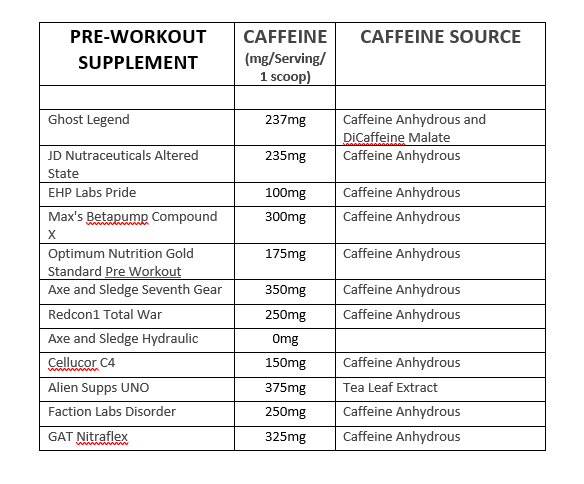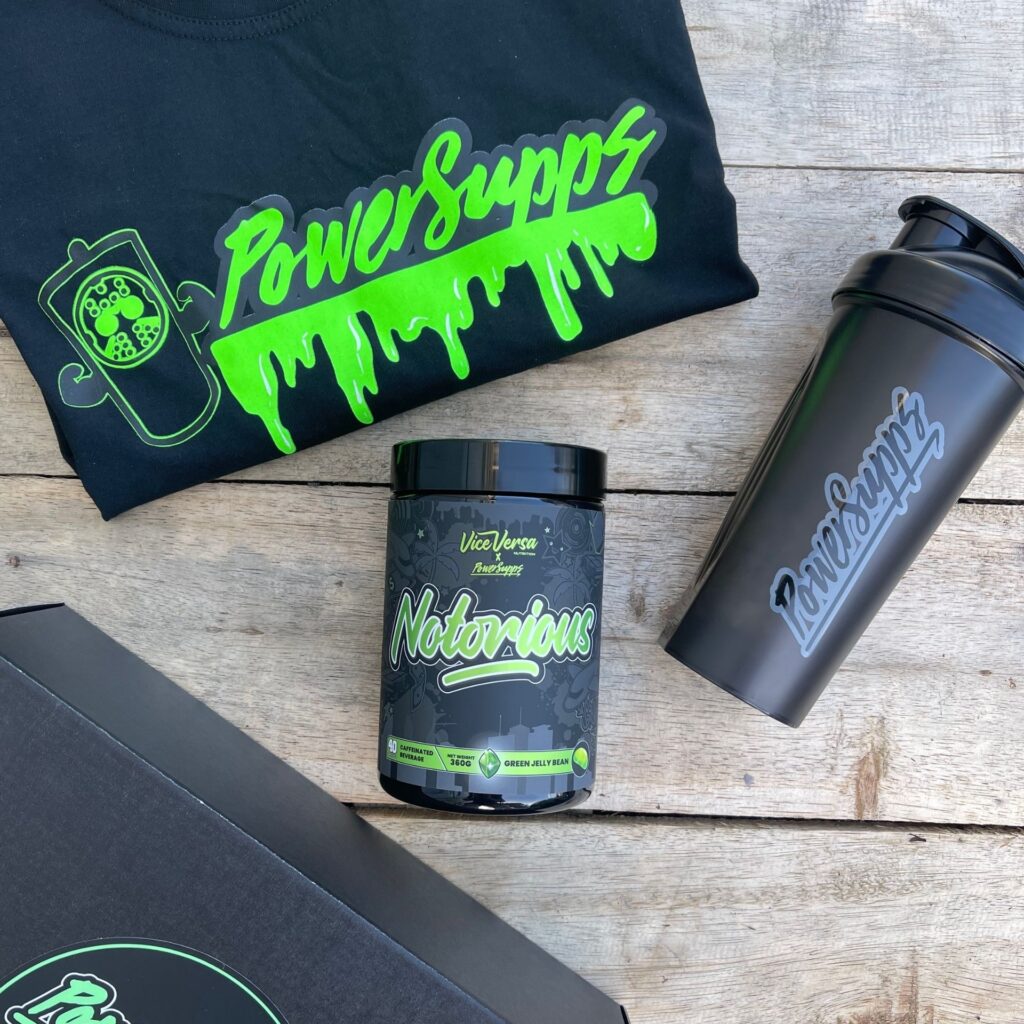Supplements
How Much Caffeine In Pre workout
Seemingly pre-workout supplements aren’t such a small category these days. With the influx of fit-fluencers and an emphasis on muscular physiques the aim of ‘crushing’ your daily workouts has become somewhat of the norm. Our own motivation can wain at times, it’s nothing bad, it happens. The main role of the humble pre-workout for most is the tool to enhance performance! Do you know how much caffeine is in the pre workout you are currently using?
What Are Pre-workout Supplements?
Most pre-workout supplements are a combination of ingredients that are designed to increase energy, enhance focus and boost overall performance. The proprietary formulas generally contain a mix of ingredients that have been scientifically proven to increase blood flow, strength, overall performance and enhance fat loss.
Just as with any supplement, the formulas of pre-workouts will differ between products. Although they are generally a blend of the above, the exact formulas will differ.
What Do Pre-workout Supplements Do?
One of the key ingredients in a pre-workout supplement is caffeine. Caffeine together with the other ingredients have the primary aim of giving you that much wanted energy boost and motivation.
Although the stimulant ingredients play a significant role in pre-workout products they are just one component. Other ingredients are included to increase blood flow and to oxygenate the working muscles. Some formulas have also become quite clever and contain branched chain amino acids. This will aid in muscle protein synthesis and enhance repair and recovery.
How Much Caffeine is in Pre workout Supplements?
There isn’t exactly a definitive answer here. The caffeine content in pre workout supplements can vary substantially. This makes it somewhat of a difficult task to find which product may be best suited to you. Generally speaking, most tend to contain somewhere between 150-400mg of caffeine per serve. So as you can see – there can be quite a difference. For some a lower level of caffeine is more than sufficient, whereas others love the high stimulated feeling.
Keep in mind too, that some brands can tend to hide the amount of caffeine in their proprietary blends. This can make it a little tricky to determine the suitability of the product to your needs. We’ve taken our top pre workout supplements and compiled them into a table showing the concentration of caffeine per serve together with their caffeine source.
What Are Common Forms Of Caffeine?
There are a few common forms of caffeine that can be found in stimulant based Pre Workout products.
Natural Caffeine – Caffeine from natural sources such as coffee beans, tea leaves, cocoa beans, and guarana berries
Caffeine Anhydrous – Most common form used in fitness supplements. Anhydrous means “with all water removed” and per gram, is the most cost effective and most highly concentrated form of caffeine.
Dicaffeine Malate – Is an ionic bonded combination of caffeine and malic acid.
Caffeine Citrate – Is a combination of caffeine anhydrous, citric acid monohydrate, and sodium citrate dihydrate and is not naturally occuring.
Caffeine Content In Popular Pre Workout Supplements

Is A Pre-workout With Caffeine Safe?
So if there is such a varying degree of caffeine between the supplements then is a pre workout containing caffeine safe? Well yes – when used sensibly that is.
Setting aside any of the myths and controversy regarding caffeine, research suggests that moderate caffeine consumption does have notable health benefits.
Benefits of caffeine include –
- Enhanced weight loss due to it’s thermogenic and appetite suppressing properties.
- Caffeine can enhance mental alertness, focus and overall mental functioning.
- Decreased fatigue.
Benefits aside, when caffeine is used irresponsibly it’s benefits are significantly outweighed. When consumption is high there can be a few health related side-effects that can make the ingredient not seem so appealing.
Caffeine generally only has a negative effect in circumstances such as :
- Taking well over the recommended dose per day or not as per the manufacturers instructions.
- Caffeine sensitive and then may experience some negative side effects.
- If you are allergic, or have contraindications to health conditions or specific medication.
Do All Pre Workouts Contain Caffeine?
Not all pre workouts contain caffeine. This is great news for those who are either sensitive to caffeine or simply prefer not to use before training. If this is you take a look at our Stimulant Free Pre Workout section for more information.
There are plenty of very well thought out pre-workout supplements that contain very minimal caffeine or none at all. Particularly if you prefer a night time gym session then a stimulant–free supplement will be more suitable to avoid any unwanted sleep disturbances.
How Much Caffeine Should I Have Before A Workout?
For the benefits of caffeine to be apparent, the lower limit dosage is 150mg. If you are relatively knew to taking pre-workouts then it is always suggested to begin at a lower dose, assess your reaction and adjust from there.
Up to 400mg per day is the suggested upper limit of caffeine consumption and is deemed safe for the average healthy adult. When equating this to cups of coffee per day, it is roughly the caffeine content in four cups of coffee per day or two energy drinks.
If you are not a coffee or energy drink lover and pre-workout is your only form of stimulant then a higher dose per serve pre-workout might be your workout saviour. As 400mg is the upper limit of caffeine across the day just keep an eye on the amount of lattes, flat whites or energy drinks you consume in conjunction with your pre-workout energy hit.
Does More Mean More? And How Much Is Too Much?
As with most supplements – more does not always mean more. It may be ‘on trend’ to take more than one scoop of your favourite pre-workout supplement in favour of slaying your workout but this is in fact not the case.
As we have touched on above, these supplements are multi-ingredient blends that contain other complimenting ingredients to create the ultimate performance enhancing effect.
Looking over the ingredient panel to identify other performance-boosting ingredients will ensure that there is not such a heavy reliance on just one key ingredient. Other ingredients such as Citrulline, Creatine, Beta-Alanine and nootropics will provide a well-rounded supplement that has an effective yet smoother result overall.
The Pros And Cons Of Using A Stimulant Based Pre-workout
Some people love pre-workouts and some choose to avoid them altogether. Essentially it all comes down to personal preference. Aside from protein powder, pre-workouts do tend to be the holy grail of all supplements. As with any dietary supplements there are two sides to the coin. Here are some pros and cons to using a stimulant-based pre workout.
Pros
- Improves mental focus and functioning.
- Boosts energy and improves motivation.
- Improves overall exercise performance and endurance.
Cons
- Overuse or not taking breaks from stimulants can cause tolerance.
- Sleep disturbances if used in the evening.
- Side-effects from overuse.
- Too much caffeine can cause increased issues with anxiety and blood pressure.
Our Final Thoughts
If the caffeine from good old coffee beans doesn’t quite cut it for you in terms of performance enhancing effects then a caffeinated pre workout supplement will no doubt do the trick. There is no denying that our daily exercise routine can greatly benefit from the positive effects that caffeine in pre-workout supplements can give you.
In terms of just how much is too much, 150mg is an adequate dose of caffeine that will provide you with benefits that will have you hitting PB’s in no time. Caffeine intake has an upper limit of 400mg per day. And although some pre-workouts sit somewhere between the 300-400mg caffeine per serve this is not always the sweet spot for some. When used in moderation, caffeine provides a countless array of natural performance-enhancing benefits with minimal or no side effects.
Lastly, when it comes to choosing the supplement that is suited to you it is beneficial to be familiar with the ingredients. Being aware of the caffeine content and other key compounds will ensure that you can make an informed choice on which pre-workout supplement is best suited to you.

